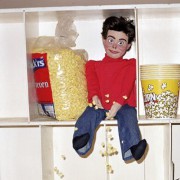 Photo: Getty Images
Photo: Getty Images
The word addiction usually causes people to think of alcohol, drugs or even sex. But what about eating toilet paper or bodybuilding or ventriloquism?
A new show called “My Strange Addiction” on TLC explores the unusual addictions that some people have, including those mentioned above and others, like an addiction to cats.
Many of the people featured on the show happen to be women.
Mike Dow, a psychotherapist and addiction expert for the show "My Strange Addiction" and "Freaky Eaters" (a show about food addiction), said that in his experience men and women tend to be addicted to different things.
“Men tend to gravitate toward some of the addictions that are more dopamine-based,” Dow said. This includes sex and drug addiction.
Women tend to gravitate toward painkillers and alcohol, he said. There are also probably more women with body-associated addictions - women tend to have more disorders associated with body issues anyway, like eating disorders and body dysmorphic disorder, though statistics are changing.
“It’s no coincidence to me because women also have less serotonin in their brain, and a lot of the behaviors on ‘My Strange Addiction’ … are really helping the women to get a sense of peace in their life,” Dow said. “They’re not really seeking excitement … they’re getting some comfort that they really need in their life that they’re not getting.”
Most people are not familiar with the addictions present on the show, but perhaps the show is bringing awareness.
“Certainly there’s no 12-step group if you’re addicted to sleeping with your hair dryer, but I think a lot of people have compulsions like this that give them a sense of peace or well-being,” Dow said.
For example, some people bite their nails or light a certain candle at night or have certain rituals.
“I think we can all relate to things becoming a habit in our lives, and if those habits are bad for you, then they have the power to be labeled as addictions or compulsions,” Dow said.
Basically, addictions are “bad” and rituals are “good.” Addictions can be harmful to the self and/or another person. In treatment, Dow replaces the harmful behaviors with healthy ones, and looks into underlying causes of the addiction.
“If you don’t put all your eggs in one basket, and you have a sort of nice, even, healthy spread of what makes you feel good in your life, then you’re not in danger of overdoing it,” Dow said.
It can be scary to admit you have an addiction, but the women on the show are exposing themselves for the whole world to see. This isn’t necessarily a bad thing though.
“There’s a saying in 12-step program – you’re as sick as your secrets,” Dow said. “There’s something really healing about coming forward and making your addiction public because it is no longer a secret … if it’s on national television, your addiction is no longer a secret … It helps people to know that they’re not alone.”
Although there are many positives for people talking about their experiences on the show, there could possibly be backlash from others.
“No matter what it is, they’re going to have to have the strength to deal with those things, but I also know that that’s life,” Dow said. “When I work with a patient, I prepare them for the responses that they may get … It is your responsibility to treat your addiction, but it’s not your fault that you have the addiction.”
Some are not sure they have an addiction, are in denial or rationalize their behavior, but the women on the show do see therapists at some point to talk about their addictions.
“We’re not going to get a success every single time we treat somebody,” Dow said. “Much like alcoholism or drug addiction, that addict needs to hit rock bottom, and they need to suffer the consequences until they are ready.”
However, therapists can still send out messages to people with addictions about how harmful the addictions are and how they can overcome them.
Addiction can be technically referred to as substance abuse or substance dependence, and it can even be associated with impulse control disorder and obsessive-compulsive disorder. Also, some people use the word addiction as a slang term, which can be confusing.
“It does sort of marginalize addiction as a true disease, which I do believe that it is,” Dow said. “We have to have some compassion and understanding of addiction as a disease.”
There is generally no single cause of addiction. It can be the result of multiple factors, like sexual abuse, trauma, brain chemicals and genetics.
“They all are sort of little pieces in a very complicated and large puzzle,” Dow said.
Do you have any “strange” addictions or compulsions? What do you do to handle them?
Click here to find out more information about the show: http://tlc.discovery.com/tv/my-strange-addiction/




Add a CommentComments
There are no comments yet. Be the first one and get the conversation started!